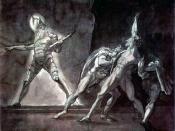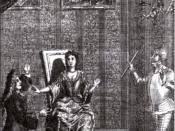Hamlet
People are not always how they appear to be. As an audience, people may perceive characters in a variety of ways. In William Shakespeare's play, Hamlet, there are many characters in multiple situations which portray their intentions conversely. The characters Hamlet, Claudius, and the Ghost all must deceive others using different tactics and strategies in order to hide their true motives.
Hamlet utilizes various tactics to deceive the other characters in the play. For instance, it appears as though Hamlet has a love interest, Ophelia, in which he decides to approach her father with hesitancy and secrecy. After a long conversation with Polonius, Hamlet says, "For if the sun breed maggots in a dead dog, being a good kissing carrion- Have you a daughter?"(91). By acting crazy while conversing with Ophelia's father, Hamlet is able to speak aimlessly through words from his book, hiding his true thoughts and feelings.
This saves Hamlet the trouble of creating lies for every other person and effectively conceals any information he may slip out about his father's murder while staying consistent in his acts. Another example is where Hamlet switches from a defensive stance to an offensive one. While being questioned by Rosencrantz and Guildenstern, Hamlet develops a plan to justify Claudius' guilt of murder. When finally alone, Hamlet states, "About my brains! - Hum, I have heard that guilty creatures sitting at a play have, by the very cunning of the scene, been struck so to the soul that presently they have proclaimed their malefactions. For murder, though it have no tongue, will speak with most miraculous organ" (117). In his soliloquy, he states that he has heard that guilty individuals have confessed their sins by just the intensity of a scene from a play and if not outwardly spoken, you...



Well done!
Up till now, I've had no interest in this "Hamlet". However, after reading your essay, i think i should change my mind.
0 out of 0 people found this comment useful.